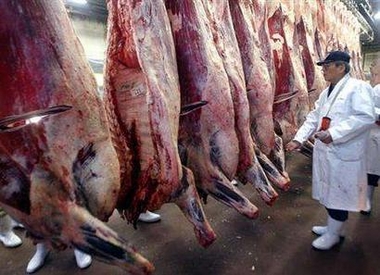|
Japan theatens to halt US beef imports
(AP)
Updated: 2006-01-20 19:26
Japan's agriculture minister recommended a total halt to
American beef imports if officials confirm a recent U.S. meat shipment contained
material considered at risk for mad cow disease, a ministry spokesman said.

A Japanese meat dealer examines Japanese
cattle carcasses at a wholesale meat market in Tokyo January 7, 2004.
Japan has found risk material that could cause mad cow disease in beef
imported from the United States, a farm ministry official said on Friday.
[Reuters] |
The threat to close the doors to U.S. beef came just a month after Japan
partially lifted a two-year-old ban on American imports. That ban was imposed in
2003 following the discovery of mad cow disease in the U.S. herd.
Agriculture Minister Shoichi Nakagawa made the recommendation in a report
sent to Prime Minister Junichiro Koizumi, ministry spokesman Hiromasa Sakuma
said.
The report was prompted by the discovery of suspicious material in U.S. beef
at Narita international airport outside Tokyo. Nakagawa said the beef could have
contained pieces of cattle backbones, according to Yumiko Sakurai, a ministry
official. That would violate terms of an agreement allowing American beef back
in the country.
"A thorough investigation needs to be conducted," Nakagawa told reporters.
Kyodo news agency reported earlier Friday that Japanese officials had decided
to halt imports completely, but Sakurai said she could not immediately confirm
the report and that the ministry was preparing a statement.
The deal that allowed the resumption of U.S. imports was limited to meat from
cows aged 20 months or younger. The agreement excluded spines, brains, bone
marrow and other parts of the cow thought to be at particularly high risk of
containing mad cow disease.
U.S. lawmakers have been pressing Japan to allow beef from cattle that has
been slaughtered at up to 30 months of age, as called for under international
animal health guidelines. But Nakagawa rejected those demands Wednesday, saying
Japan could not accept such a change to the terms of the agreement.
Before the ban, Japan was the most lucrative overseas market for American
beef, buying some $1.4 billion worth in 2003. Despite its return to local
supermarket shelves and restaurant menus, U.S. beef still faces an uphill
struggle in Japan, where consumers are particularly sensitive to safety
concerns.
Mad cow disease is the common name for bovine spongiform encephalopathy, or
BSE, a degenerative nerve disease in cattle that is linked to a rare but fatal
nerve disorder in humans, variant Creutzfeldt-Jakob Disease.
Cows aged 20 months or younger so far have been free of the
disease.
|